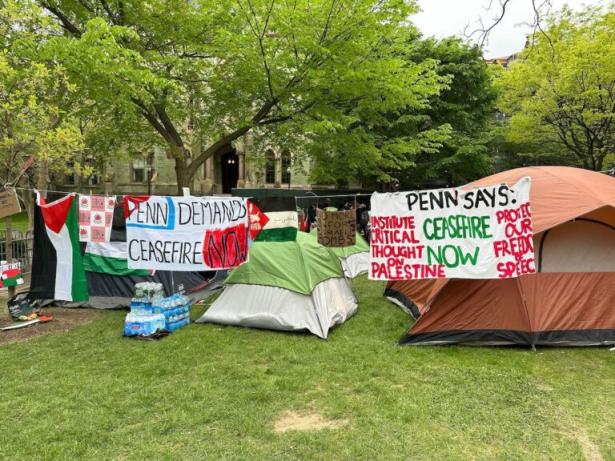In case you haven’t followed it, students on over 140 campuses (and counting) around the US, and now globally, have been setting up encampments to demand that their universities take steps to end the war in Gaza. Over 2,000 people have been arrested around the country.
You may not agree with their demands. And you might not like their strategy. But here is what I think everyone should know and be deeply worried about:
- Students have little to no democratic voice in how universities are run. You may think protests are ineffective or unproductive or chaotic, but what else can they do when they have serious concerns about their schools' priorities?
- These protests have been overwhelmingly peaceful. It's really hard to find exceptions to that, and some of the stories of dangerous conditions have turned out to be false. For example, the president of City College called on the NYPD to dismantle the encampment with the only evidence of “danger” being the presence of tents and flags.
- Antisemitism exists everywhere in society, and we need to call it out and challenge it. But the amount of antisemitism in these protests, from what I’ve seen, is FAR less than what I see in regular daily life - in fact, I can't point to an example. That doesn’t excuse antisemitism, but it does suggest we can’t cry wolf about it, because that means calling out the real examples of it becomes a lot harder. As a Jewish person, I’m far more afraid of the antisemitism I see from those in positions of power (like Congress!!) than I am of what a random 20-year-old says on social media.
- Universities are coordinating with one another and elected leaders to crackdown on the protests. The crackdowns are extreme. Some of the playbook involves:
- arbitrarily changing rules about protesting with little to no input or notice
- issuing statements about students being in danger due to protests, with little to no proof
- blaming protests on “outside agitators,” even on campuses where outsiders have no means of entry
- labeling protestors (students and faculty) as antisemitic, often with little or no proof
- calling in police to harass, brutalize and arrest students
- allowing police free reign to attack students, staff, and faculty with no oversight (police are breaking the laws, stealing and breaking personal items)
- police have arrested people without cause or notice, caused injury, and violated civil rights
- allowing violent counter-protestors on campus with NO police response
- adopting a “both sides” approach when counter-protestors have initiated violence
- Holding students for extended periods of time, without access to a lawyer, which is not common for these kinds of arrests.
- Students and faculty who are arrested are facing severe criminal charges, including felony charges. Students, including bystanders, are being expelled from classes and housing. Faculty are being punished. For example, Annelise Orleck, Professor of History and former head of Jewish Studies at Dartmouth, has been banned from the campus where she has taught for 34 years for trying to defend her students.
THERE IS ANOTHER WAY! The Evergreen State University has agreed to the student demand to divest. Brown University is going to put the issue to a vote at the Board of Trustees (and it may lose, but at least there is a process). Rutgers University is establishing a task force to address a host of demands.
- There is a lot of misreporting going on, and grossly misleading, and even false, statements by people like President Biden and Mayor Adams in NY. Please follow independent media, talk to people on the ground, and read what the students themselves are saying, which is *at least* as reliable as police press releases.
- Yes, certainly there are Jewish students who feel uncomfortable with the protests on their campuses. And there are Palestinian students who are in deep trauma and grief. And there are Jewish students who are outraged at wht they feel is a genocide being committed in their name. And there are American students outraged at their tax dollars going to fund war in Gaza and militarized police forces. I can't imagine why anyone would feel "comfortable" in this moment, and the university crushing dissent certainly won't resolve any of this.
WHAT TO DO? STEPS INCLUDE:
The House passed HR6090, which will help to criminalize student protestors. The Senate hasn't voted yet, on S. 4091 Email your senators: innmvmt.org/emailcongress?t=0Mt7II.
Students (and faculty and staff) around the country need your support to protect their right to protest. They need calls to local officials and university administrators to drop charges and hold police accountable. In some cases, they need money for medical treatment and to replace items broken or stolen by the police.
If you are in a university-based union, check with them to find ways to support the protests. Many students and faculty are represented by unions that are participating in campus demonstrations, supporting negotiations, and calling for support and accountability from administrators and police.
Stephanie Luce is a Portside moderator.


Spread the word